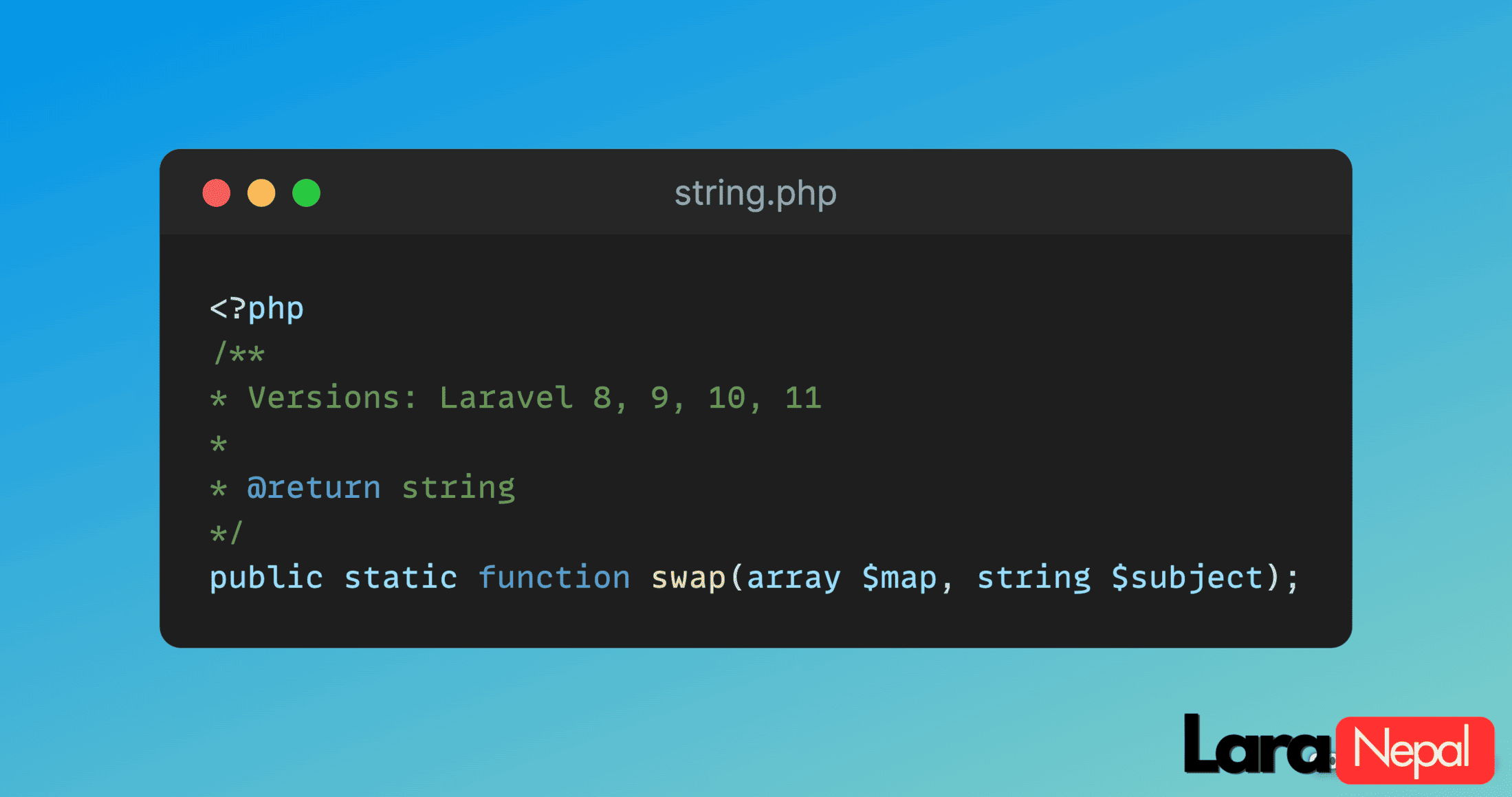How To Replace Key/Value Pairs In Strings Using The Swap Helper Method In Php
Published on January 19, 2025 by Dinesh Uprety

How to Replace Key/Value Pairs in Strings Using the swap Helper Method in PHP
When working with strings in PHP, replacing placeholders with actual values is a common task. For example, you might
want to personalize an email template by replacing placeholders like [name] with a recipient’s name. While PHP offers
traditional string replacement methods, they can sometimes behave unexpectedly.
In this article, we’ll explore a better way to replace placeholders using the swap helper method from Laravel’s string utilities.
What is the swap Helper Method?
The swap helper method is a function in Laravel that allows you to replace key/value pairs within a string. It
ensures
that placeholders are replaced only as intended, avoiding issues that might arise with traditional string replacement
methods.
Why Do We Need the swap Helper Method?
Let’s say we have the following email template:
<?php $emailTemplate = <<<TEMPLATEHello [name], Thank you for reaching out! We are working to process your request;in the meantime, you may find the following resources helpful:[resources] Sincerely,[sender]TEMPLATE;This template includes placeholders like [name], [resources], and [sender]. Our goal is to replace these
placeholders
with real data, such as the recipient’s name, a link to resources, and the sender’s name.
The Traditional Approach: Using Str::replace()
To replace placeholders, we can use the Str::replace() method from Laravel. Here’s how we might write a function to
personalize the email template:
<?php use Illuminate\Support\Str; function renderEmailTemplate($template, $name, $resources, $sender) { return Str::replace( ['[name]', '[resources]', '[sender]'], [$name, $resources, $sender], $template );}When we call this function:
<?php renderEmailTemplate( $emailTemplate, 'Alice', 'https://example.com/resources', 'Core Team');The output is:
Hello Alice, Thank you for reaching out! We are working to process your request;in the meantime, you may find the following resources helpful:https://example.com/resources Sincerely,Core TeamThe Problem with Str::replace()
The Str::replace() method works well in most cases, but there’s a problem: it can unintentionally replace parts of the
inserted text if the input contains placeholders.
For example, consider the following input:
<?php renderEmailTemplate( $emailTemplate, '[resources] Director', 'https://example.com/resources', 'Core Team');The output is:
Hello https://example.com/resources Director, Thank you for reaching out! We are working to process your request;in the meantime, you may find the following resources helpful:https://example.com/resources Sincerely,Core TeamThe [resources] placeholder in the recipient’s name was replaced unexpectedly. This behavior can cause bugs or lead to
incorrect outputs.
The Solution: Using Str::swap()
The swap helper method solves this problem by ensuring placeholders are replaced only where they appear in the
original template. Here’s how we can rewrite the function:
<?php use Illuminate\Support\Str; function renderEmailTemplate($template, $name, $resources, $sender) { return Str::swap( [ '[name]' => $name, '[resources]' => $resources, '[sender]' => $sender, ], $template );}Now, if we call the function with the same problematic input:
<?php renderEmailTemplate( $emailTemplate, '[resources] Director', 'https://example.com/resources', 'Core Team');The output is as expected:
Hello [resources] Director, Thank you for reaching out! We are working to process your request;in the meantime, you may find the following resources helpful:https://example.com/resources Sincerely,Core TeamFluent Strings with swap
The swap method is also available on fluent string instances, which can make your code more readable. Here’s the same
function written with fluent strings:
<?php function renderEmailTemplate($template, $name, $resources, $sender) { return str($template)->swap([ '[name]' => $name, '[resources]' => $resources, '[sender]' => $sender, ])->toString();}Key Order in swap
The swap helper processes replacements based on the length of the keys, starting with the longest. This
ensures
predictable behavior. For example, the following two calls produce the same result:
<?php use Illuminate\Support\Str; Str::swap([ '[name]' => $name, '[sender]' => $sender, '[resources]' => $resources,], $template); Str::swap([ '[resources]' => $resources, '[sender]' => $sender, '[name]' => $name,], $template);Conclusion
The swap helper method is a reliable way to replace placeholders in strings without unexpected side effects. It’s
especially useful when working with templates that may contain overlapping or user-provided data. By using swap, you can
avoid common pitfalls and ensure your string replacements behave as intended.